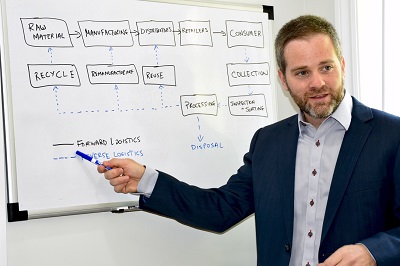Benefiting Business
 Dr. Matthew Wilson, an assistant professor in the Department of Marketing and Hospitality Services Administration, analyzed the role artificial intelligence (AI) plays in improving reverse logistics within the circular economy. The circular economy is a system that aims to minimize waste and maximize the value of input by reusing, repairing, and recycling consumer goods. One component of the circular economy is reverse logistics, whereby used and unwanted items flow from consumers back to manufacturers, to be reused, remanufactured or recycled (e.g. Apple’s device trade-in program).
Dr. Matthew Wilson, an assistant professor in the Department of Marketing and Hospitality Services Administration, analyzed the role artificial intelligence (AI) plays in improving reverse logistics within the circular economy. The circular economy is a system that aims to minimize waste and maximize the value of input by reusing, repairing, and recycling consumer goods. One component of the circular economy is reverse logistics, whereby used and unwanted items flow from consumers back to manufacturers, to be reused, remanufactured or recycled (e.g. Apple’s device trade-in program).
Dr. Wilson and his coauthors began their research by outlining a typical reverse logistics process, which includes four key functions: network design, collection, warehousing, and processing. Network design relates to the general configuration of reverse logistics infrastructure, such as the locations of processing facilities and disposal plants. The collection function involves the accumulation and transportation of used products from collection points to processing centers. The next step is warehousing; this includes sorting, consolidating, and managing returned goods inventory. Lastly, processing involves all the steps needed to repair, remanufacture, recycle, or dispose of the used products.
Recent years have shown a growing interest in AI applications, both in academia and in industry. Drawn in by its fast-evolving nature, Dr. Wilson sought to learn more about AI’s potential impact on reverse logistics and the circular economy. He and his coauthors then conducted a literature review to better understand the potential applications of AI in reverse logistics. They found three forms of AI – specifically mechanical, analytical, and intuitive – can significantly contribute to reverse logistics tasks. For example, intuitive AI can assist managers in determining alternative uses for returned goods, and analytical AI can be used to find the optimal sequence to disassemble a product.
Through his research, Dr. Wilson illustrates the value that different forms of AI can bring to reverse logistics processes, and hopes to inspire future research on the opportunities of using AI in the circular economy.
At CMU We Do Research, We Do Real World
Story by ORGS intern Hailey Nelson
July 2021